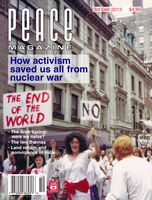
Peace Magazine Oct-Dec 2013, page 28. Some rights reserved.
Search for other articles by Margrit Eichler here
Muzzled Scientists and Wilful Blindness in Stephen Harper’s Canada. By Chris Turner. Vancouver: Greystone Books, 2013
“Do No Science, Hear No Science, Speak No Science—that is the Harper agenda. And if this agenda is most evident and most pronounced in environmental science, that’s simply because it is the field most likely to uncover evidence that the government’s paramount goal—to free the country’s resource extraction industries from oversight in the name of rapid expansion—is wrongheaded, reckless, and damaging.”
Turner details the many ways in which the Harper government has muzzled scientists and science. Bits and pieces of this have been documented elsewhere, but Turner pulls together a lot of information that has not been so conveniently braided together before, and he supplements it with considerable new research. This alone would make the book worth reading.
However, Turner goes a lot further than that. He looks at the basis on which democracy rests and traces it back to the Enlightenment era in which ideology and superstition were replaced with scientific evidence. All Canadian governments until 2011 (when Harper won a majority), regardless of their political stripe, agreed that science itself was outside the partisan fray. Scientific evidence, although often ignored, was understood as the basis on which policy decisions should be made.
With Harper’s majority, that principle is abandoned. If scientific evidence contradicts the conservative ideology and hence government policy, it is the science that is declared to be at fault. It follows that if the capacity to collect such evidence is destroyed, the problem no longer exists. Therefore, we are witnessing an unparalleled destruction of scientific organizations, and a muzzling of the remaining government scientists who find unpalatable facts. We have moved into an “age of wilful blindness.”
This also marks a fundamental turn away from democracy. No longer is government an instrument of the public interest “charged with protecting that interest by gathering the best available information and using it to draft laws that best protect and extend and enhance it.” Under Harper, science is seen as valuable only to the degree to which it fosters short-term economic goals. For instance, the National Research Council, until recently devoted to basic research, is now to serve as the “concierge” for industry. But subordinating science to economic goals destroys the scientific creativity that leads to real breakthroughs, which in turn have the potential to become economically profitable.
The war on science is ultimately a war on scientists—and Canada stands to lose the best and brightest of them.
“Harper’s Canada is a country, alone among the democratic nations, that bars its scientists from discussing their work in public and sends spin doctors to ensure that message discipline trumps scientific fact even at academic conferences. It is a country where environmental advocacy is foreign and dissenting opinion treated as treasonous, a country where scientists march in the streets to reassert the primacy of the scientific method and doctors need to disrupt press conferences if expert analysis is to be heard in discussions of health care policy.”
Harsh words. Unfortunately, they are true. This is a book everyone who cares for Canada should read.
Reviewed by Margrit Eichler, of Toronto.

Peace Magazine Oct-Dec 2013, page 28. Some rights reserved.
Search for other articles by Margrit Eichler here